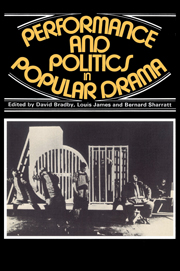 Performance and Politics in Popular Drama
Performance and Politics in Popular Drama Book contents
- Frontmatter
- Contents
- List of contributors
- Preface
- Acknowledgements
- PART ONE Spectacle, performance and audience in nineteenth-century theatre
- PART TWO Politics and performance in twentieth-century drama and film
- PART THREE Problems and prospects
- Introduction
- The politics of the popular? – from melodrama to television
- After Fanshen: a discussion, with the Joint Stock Theatre Company, David Hare, Trevor Griffiths and Steve Gooch
- Appendix: Tempo, Tempo
- Select bibliography
- General index
- Index of titles of plays, films, sketches
- Index of theatres, theatre companies and groups
The politics of the popular? – from melodrama to television
Published online by Cambridge University Press: 08 March 2010
- Frontmatter
- Contents
- List of contributors
- Preface
- Acknowledgements
- PART ONE Spectacle, performance and audience in nineteenth-century theatre
- PART TWO Politics and performance in twentieth-century drama and film
- PART THREE Problems and prospects
- Introduction
- The politics of the popular? – from melodrama to television
- After Fanshen: a discussion, with the Joint Stock Theatre Company, David Hare, Trevor Griffiths and Steve Gooch
- Appendix: Tempo, Tempo
- Select bibliography
- General index
- Index of titles of plays, films, sketches
- Index of theatres, theatre companies and groups
Summary
This paper attempts two things: to seek connections between some of the topics covered by the Kent conference, and to explore some problems concerning the possibility of popular political drama today. It is not offered as either a report on research or as a fully elaborated thesis; given the complexity of the issues tackled and limitations on space, I can present only compressed points and some methodologically eclectic and schematic hypotheses. A brief comment on some problems of ‘Marxist criticism’ can serve as introduction.
There are various difficulties involved in trying to relate the history of an art-form to the history of class struggle; most attempts to do so begin from the art-object, the artefact, and seek to connect its ‘content’ and/or ‘form’ to the conditions of its production; a work of art can then be seen as expressing, embodying, working through, or otherwise ‘containing’ the ideology of a social class. In Goldmann's criticism, for example, the work is grasped as the summation or intensification, the most coherent articulation, of a world-view; whereas for Macherey the work betrays, in its very silences, inconsistencies and contortions, the fissures and gaps which always fracture and undermine the dominant ideology of a period. Such approaches have difficulties with the notion of authorship; Lukacsian theories rely upon a dubious attribution of ‘representativeness’ to an author, while for Althusserians the ‘author’ tends to evaporate into a complex instance of relatively autonomous signifying practices – six textual codes in search of a typewriter.
- Type
- Chapter
- Information
- Performance and Politics in Popular DramaAspects of Popular Entertainment in Theatre, Film and Television, 1800–1976, pp. 275 - 296Publisher: Cambridge University PressPrint publication year: 1980
- 6
- Cited by


